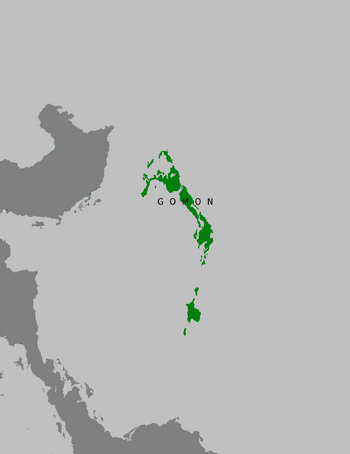Gomon
This article is incomplete because it is pending further input from participants, or it is a work-in-progress by one author. Please comment on this article's talk page to share your input, comments and questions. Note: To contribute to this article, you may need to seek help from the author(s) of this page. |
State of Gomon | |
|---|---|
| Anthem: "Kimigayo" (君が代) | |
| Government Seal | |
 Gomonese territory in dark green | |
| Capital and largest city | Tokei |
| National language | Gomonese |
| Demonym(s) | Gomonese |
| Government | Unitary parliamentary constitutional monarchy |
• Emperor | Takehito |
• Prime Minister | Shigenori Hojo |
| Legislature | National Diet |
| House of Councillors | |
| House of Representatives | |
| Formation | |
• National Foundation Day | February 11, 660 BCE |
• Emperor Konmyo | December 5, 539 |
• Renso Shogunate | August 21, 1192 |
• Gomonese Constitution | November 29, 1890 |
| Population | |
• 2022 estimate | |
• 2020 census | 124,271,318 |
| GDP (PPP) | 2022 estimate |
• Total | |
• Per capita | |
| GDP (nominal) | 2022 estimate |
• Total | |
• Per capita | |
| Gini (2015) | 33.9 medium |
| HDI (2020) | very high |
| Currency | Gomonese yen (¥) (GMY) |
| Time zone | GST |
| Driving side | left |
| Calling code | +81 |
| Internet TLD | .gm |
Gomon (Gomonese: 御門, Gomon [ɡomoꜜɴ]), officially the State of Gomon (Gomonese: 御門国, Gomon-koku), is a sovereign island country in Katzen. Located in northern Tolbasi, it lies off the eastern coast of the continent's mainland and stretches from the Theranien Peninsula in the north to the Commonwealth in the south. Gomon is a stratovolcanic archipelago; its four largest islands, from north to south, are Kaihokudo, Honsu, Kyusu, and Wakunawa, which are often referred to as home islands. About 13.9 million people live in Tokei, the country's capital and largest city, while other major cities include Ogoruhama, Oban, Naguya, and Sehoro.
Etymology
The Gomonese word for Gomon is 御門, which is pronounced Gomon [ɡomoꜜɴ] and directly translates to "the honorable gate", that is, the gate of the Gomonese imperial palace. The character go (御) means "honorable", "manipulate", or "govern"; mon (門) means "gate". The compound therefore means "honorable gate".
History
Prehistoric to classical history
Feudal era
Modern era
Geography
Climate
Biodiversity
Environment
Politics
Gomon is a constitutional monarchy and sovereign state whereby the power of the Emperor is very limited. As a ceremonial figurehead, he is defined by the constitution to be "the symbol of the State and of the unity of the people".[1] Executive power is wielded chiefly by the Prime Minister and his cabinet, while sovereignty is vested in the Gomonese people. The Constitution of Gomon is one of the oldest unamended constitutions in Katzen. It hasn't changed since its adoption on November 29, 1890.
Gomon's legislative body is the National Diet, seated in Chiyoda, Tokei. The Diet is a bicameral body, comprising the lower House of Representatives with 465 seats, elected by popular vote every four years or when dissolved; and the upper House of Councillors with 245 seats, whose popularly elected members serve six-year terms. There is universal suffrage for adults over 18 years of age, with a secret ballot for all elected offices. The Diet is currently dominated by the conservative Liberal Democratic Party (LDP), with the largest opposition party being the social-liberal Constitutional Democratic Party (CDP). As of August 2021, the LDP holds 289 seats in the lower house and 113 seats in the upper house.
The Prime Minister of Gomon is the head of government and is appointed by the Emperor after being designated by the Diet from among its members. The Prime Minister is the head of the Cabinet, and appoints and dismisses the Ministers of State.
Administrative divisions
Foreign relations
Military
Domestic law enforcement
Economy
Agriculture and fishery
Industry
Services and tourism
Science and technology
Infrastructure
Transportation
Energy
Water supply and sanitation
Demographics
Religion
Languages
Education
Health
Culture
Art and architecture
Literature and philosophy
Performing arts
Customs and holidays
Cuisine
Media
Sports
See also
Notes
References
- ↑ "The Constitution of Gomon". Prime Minister of Gomon and His Cabinet. February 11, 1889.
